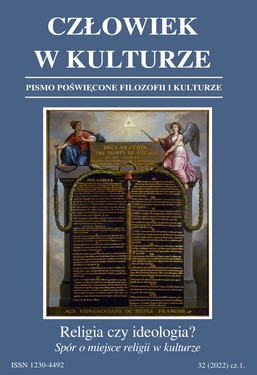Niemiecki idealizm: od panlogizmu do ateizmu i irracjonalizmu (Hegel, Heidegger)
German idealism: from pantheism to atheism and irrationalism
Author(s): Bogusław PaźSubject(s): Metaphysics, Logic, German Idealism, Philosophy of Religion, Phenomenology, Ontology
Published by: Fundacja »Lubelska Szkoła Filozofii Chrześcijańskiej«
Keywords: panlogism; metaphysics; ontology; reflexion; consciousness; (natural) theology; rationalism; irrationalism; principle of ground; poetry;
Summary/Abstract: "The main thesis of the article is: the philosophy of German idealism (G. W. F. Hegel), whose main feature was panlogism, found its conclusion in Martin Heidegger’s atheistic and antirationalist philosophy. In the system of Hegel’s philosophy a synthesis between classical metaphysics and natural theology or ontotheology took place. God as the Absolute was the first subject of this ontotheology and at the same time its supreme principle. The historical development of Heglism led to its negation in the materialistic and atheistic philosophy of Ludwig Feuerbach. Heidegger’s phenomenological method of philosophy, which focused on the temporal dimension of perception of being, led to the destruction of Hegel’s metaphysics (logic) and Leibniz’s principle of reason. As a result, not only metaphysics was abolished, but also the rationality of their questions, including the question of the existence of God."
Journal: Człowiek w Kulturze
- Issue Year: 2022
- Issue No: 32
- Page Range: 21-48
- Page Count: 28
- Language: Polish

